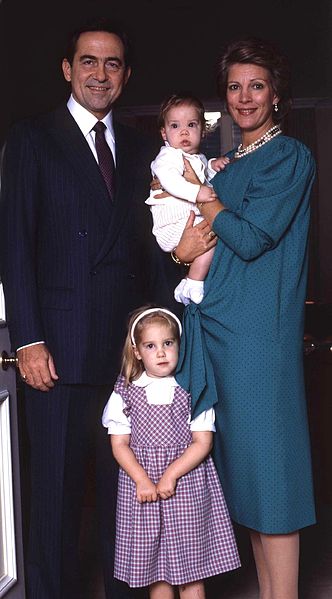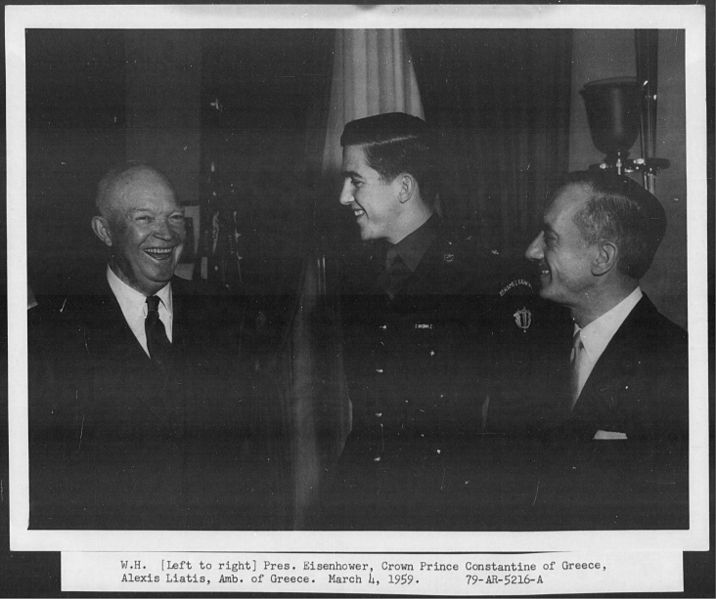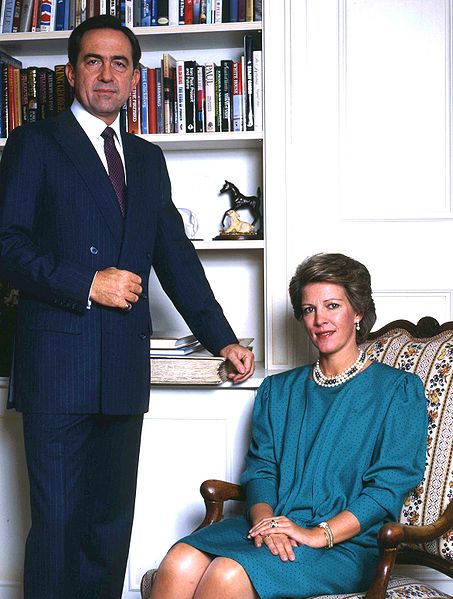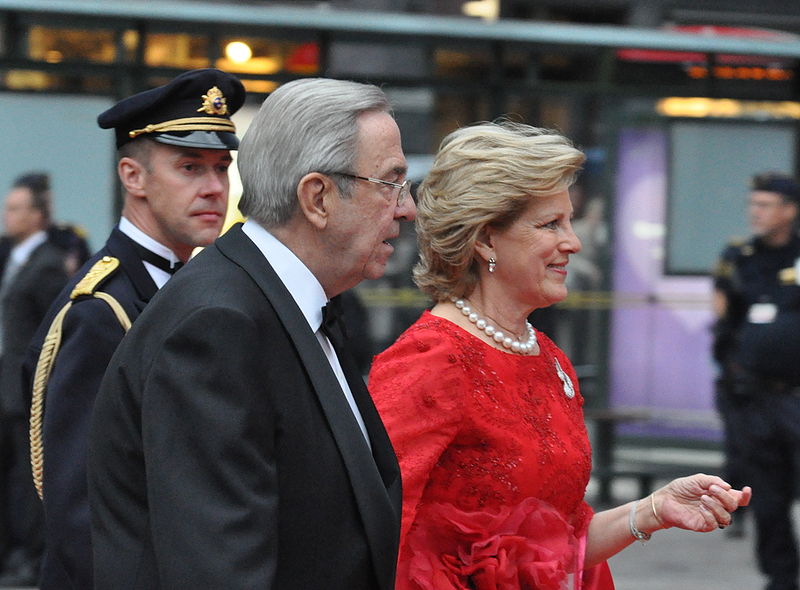<Back to Index>
- King of the Hellenes Constantine II, 1940
PAGE SPONSOR
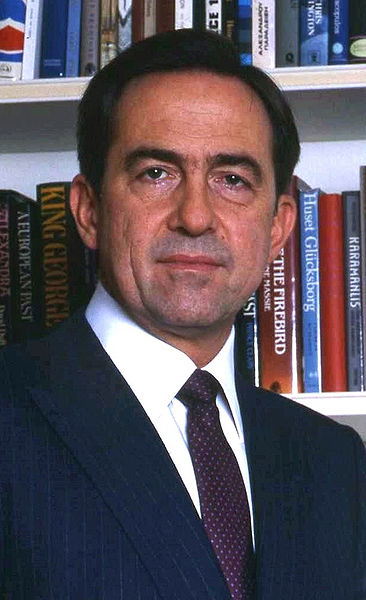
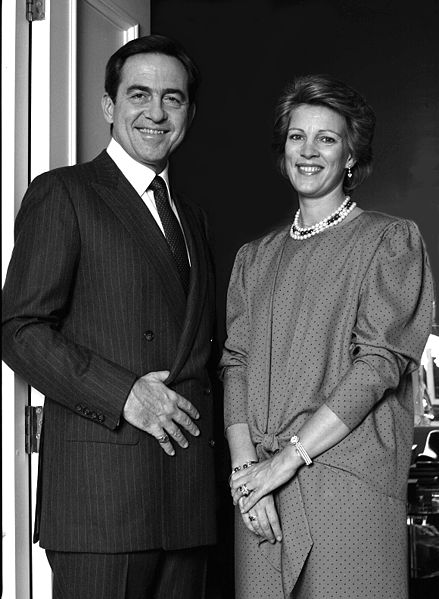
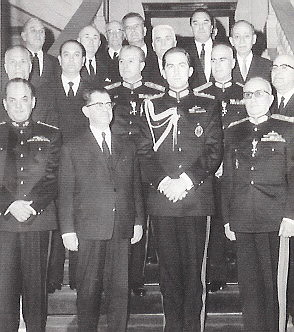
Constantine II (Greek: Κωνσταντῖνος Βʹ, Βασιλεὺς τῶν Ἑλλήνων, Konstantínos Βʹ, Vasiléfs ton Ellínon; born 2 June 1940) was King of Greece from 1964 until the abolition of the monarchy in 1973, the sixth and last monarch of the Greek Royal Family.
He succeeded his father Paul in March 1964, being styled His Majesty Constantine II, King of the Hellenes (Greek: Κωνσταντῖνος Βʹ, Βασιλεὺς τῶν Ἑλλήνων). Although the accession of the young monarch was initially regarded auspiciously, his reign soon became controversial: Constantine's involvement in the Apostasia of July 1965 made him unpopular in broad parts of the population and aggravated the ongoing political instability that culminated in the Colonels' Coup of 21 April 1967.
The coup stood on scant legitimate ground until Constantine, as head of state, agreed to inaugurate the putschist government, thereby legitimizing it; this act became the subject of much criticism. On 13 December 1967, he was forced to flee the country following an abortive counter coup against the junta, although he remained de jure head of state until 1 June 1973, when the junta abolished the monarchy and declared a republic.
This abolition was confirmed after the fall of the junta by a plebiscite on 8 December 1974, which established the Third Hellenic Republic. Constantine has never officially abdicated and remains a pretender to
the Greek throne. He has continued to live abroad since 1967, but
enters and leaves his native country freely and has a house on the
coastal resort of Saronida, outside Athens.
Constantine was born at Psychiko, a plush suburb in northern Athens, the nephew of King George II and the second child and only son of the king's brother and heir presumptive, Crown Prince Paul. His mother was Crown Princess Frederika, the former Princess Frederika of Hanover. Constantine's older sister Sofia is the current queen consort of Spain, while his younger sister, Princess Irene, has not married.
He was one year old when Nazi Germany invaded Greece, and he spent the next four years in exile in Egypt and Cape Town, (where his sister Irene was born), with his family. He returned to Greece with his family in 1946. King George died in 1947, and his brother became King Paul, making Constantine crown prince. He was educated at a preparatory school and later a boarding school where he was an above average student academically. A fellow student recalled him as, "a good chap, a young man with all the right instincts. He was at his best on the playing fields."
Constantine served in all the three armed services, attending the requisite military academies. He also attended the NATO Air Force Special Weapons School in Germany, as well as the Athens University where he undertook courses at the law school.
As a young man, Crown Prince Constantine was a keen sportsman. In 1960, at the age of 20, he competed in the 1960 Summer Olympics in Rome, winning a gold medal in sailing (Dragon Class). He was also a strong swimmer and has a black belt in karate, with interests in squash, track events and riding.
In 1964 King Paul died of cancer, and the 23 year old Constantine succeeded him as king.
On 18 September 1964, in a Greek Orthodox ceremony in the Metropolis, the Greek Orthodox cathedral of Athens, he married Danish Princess Anne - Marie of Denmark, a triple third cousin, sister of the current Danish queen, Margrethe II.
King Constantine was seen by some as young and inexperienced, and under the influence of his mother. Some politicians had a low opinion of Constantine. King Paul's long time prime minister Konstantinos Karamanlis regarded him partly responsible for his fall in 1963.
However, due to his youth, he was also perceived as a promise of change. The ascension of Constantine coincided with the recent election of Centrist George Papandreou as prime minister in February 1964, which ended 11 years of right wing rule by the National Radical Union (ERE).
Greece was still feeling the effects of the Civil War of 1944 - 49 between communists and monarchists, and society was strongly polarized between the royalist / conservative right and the liberal / socialist center left. It was hoped that the new young king and the new prime minister would be able to overcome past dissensions.
Initially, relations between the king and Papandreou seemed good, but by 1965, these halcyon days ended. The conservative establishment feared the rising influence of Papandreou's left leaning son Andreas, and the outbreak of the ASPIDA scandal seemed to confirm their suspicions.
The name of Andreas Papandreou was implicated in the case, and when the defense minister, Petros Garoufalias tried to form a committee of inquiry into the alleged scandal, the prime minister forced his resignation. Immediately, George Papandreou assigned the defense portfolio to himself, which caused alarm in the palace and the conservative security circles, which interpreted this move as an attempt by Papandreou to control the army. Constantine refused to accept the self - appointment, and a new political issue resulted.
Constantine proposed the appointment of any other person of the prime minister's choosing as defense minister because, as the king argued, there was a conflict of interest: the prime minister's son was allegedly involved in the scandal.
Papandreou rejected the king's proposition, although he had initially shown some willingness to accept it, and submitted his own resignation, stating that it was well within his constitutional powers as the elected prime minister commanding a Parliamentary majority to appoint his ministers at his pleasure, and it was beyond the constitutional powers of the king to refuse him this right.
A short time after his resignation, Constantine appointed a new government led by Georgios Athanasiadis - Novas, who failed to ensure the Parliament's confidence. This appointment, which became known as the "Royal Coup" (Το Βασιλικό Πραξικόπημα), evoked much criticism as being unconstitutional. According to the critics, the appointment of this and successive governments consisting of aisle crossers instead of the proclamation of new elections, caused a constitutional crisis and political instability that lasted for more than two years and led to the dictatorship of 1967 – 1974.
After his failure, Novas was succeeded by Ilias Tsirimokos, who also failed to form a stable government and was dismissed. Constantine next appointed some of Papandreou's dissidents, known as the July Apostates and led by Stefanos Stefanopoulos, to form a government of "king's men," which lasted until December 1966, amidst mounting strikes and protests, supported by the right wing ERE.
When Stefanopoulos resigned in frustration, Constantine appointed a caretaker government under Ioannis Paraskevopoulos,
which called elections for May 1967. This government did not even last
till the scheduled elections. It was replaced on 3 April 1967 by another
caretaker government under ERE's leader, Panagiotis Kanellopoulos.
Elections were scheduled for 28 May 1967, with expectations of a wide Centrist victory. According to United States diplomat John Day, the Americans worried that, due to the old age of George Papandreou, Andreas Papandreou would have a very powerful role in the next government.
According to the United States diplomats Robert Keely and John Owens, who were attached to the United States embassy in Greece at the time, Constantine asked United States Ambassador Phillip Talbot what the attitude of the United States government would be to an extra - parliamentary solution to this problem. The embassy responded negatively in principle, adding that "US reaction to such a move cannot be determined in advance but would depend on circumstances at time". To this day, Constantine denies all this.
According
to then Ambassador from the United States Phillip Talbot, after this
communication, Constantine met with the generals of the army, who
promised the king that they would not take any action before the coming
elections. However, they were nervous by the proclamations of Andreas
Papandreou and reserved to re-examine taking actions according to the
results of the election.
However, a traditionalist, right wing nationalist group of middle ranking army officers led by Colonel George Papadopoulos took action first and staged a coup d'état on 21 April. The coup leaders met Constantine at his residence in Tatoi, which was surrounded by tanks to prevent resistance.
Constantine later recounted that the officers of the tank platoons believed they were carrying out the coup under his orders. The king argued with the colonels and initially dismissed them. Later in the day, he went to the Ministry of National Defense, where all coup leaders were gathered, and had a discussion with Kanellopoulos and with leading generals. He agreed to concede to the military demands and swear the new regime in only when the junta agreed to include a number of civilian politicians, with a royalist nominee, Konstantinos Kollias, as prime minister.
However Panayotis Kanellopoulos, the last legitimate prime minister of Greece prior to the coup, acting as witness for the prosecution, at the junta trials in 1975 during metapolitefsi, testified how he was arrested by machine gun toting soldiers and transported to the palace to meet king Constantine. He added that during the meeting he urged the king to use his status as commander - in - chief of the Greek military to order loyal officers to crush the coup. Constantine apparently refused to do so because he feared bloodshed.
From the outset, the relationship between Constantine and the notorious regime of the colonels was an uneasy one. Constantine organized a counter coup and it was probably meant as one, although no help or involvement of the United States was forthcoming.
The king finally decided to launch his counter coup on 13 December 1967. Since Athens was effectively in the hands of the junta militarily, Constantine decided to fly to the small northern city of Kavala, east of Thessaloniki. There he hoped to be among troops loyal only to him.
The vague plan he and his advisors had conceived was to form a unit that would advance to Thessaloniki (Greece's second biggest city and unofficial capital of northern Greece) and take it. Constantine planned to install an alternative administration there. International recognition, which he believed to be forthcoming, as well as internal pressure from the fact that Greece would have been split in two governments would, the king hoped, force the junta to resign, leaving the field clear for him to return triumphant to Athens.
In the early morning hours of 13 December, the king boarded the royal plane together with Queen Anne - Marie of Greece, their two young children, Princess Alexia of Greece and Denmark and Pavlos, Crown Prince of Greece, his mother, Queen Frederika, and his sister, Princess Irene of Greece and Denmark. Constantine also took with him Premier Kollias.
At first things seemed to be going according to plan. Constantine was well received in Kavala which, militarily, was under the command of a general loyal to him. The air force and navy, both strongly royalist and not involved in the 1967 coup, immediately declared for him and mobilized. Another of Constantine's generals effectively cut all communication between Athens and the north.
However, the king's plans were overly bureaucratic, naïvely supposing that orders from a commanding general would automatically be followed. Further, the king was obsessive about avoiding "bloodshed" even where the junta would be the attacker.
Under these circumstances, rather than managing to put together a force and advancing on Thessaloniki, middle ranking pro-junta officers neutralized and arrested his royalist generals and took command of their units, which subsequently put together a force advancing on Kavala to arrest the king.
Realizing that the counter coup had failed, Constantine fled Greece on board the royal plane, taking his family and hapless premier with him.
They landed in Rome early in the morning of 14 December, where remained in exile all through the rest of military rule (although nominally he continued as king until 1 June 1973) and was never to return to Greece as king.
Constantine stated, "I am sure I shall go back the way my ancestors did." The world had changed significantly though since the monarchy had made its last comeback. Constantine continued to watch events from abroad. He said to the Toronto Star, "I consider myself King of the Hellenes and sole expression of legality in my country until the Greek people freely decide otherwise. I fully expected that the (military) regime would depose me eventually. They are frightened of the Crown because it is a unifying force among the people." With Constantine abroad, Colonel George Papadopoulos illegally appointed himself prime minister and General George Zoitakis as regent.
Over the next year the junta sent intermediaries to the king to negotiate the terms on which he might return to Greece. But Constantine insisted on the full restoration of democracy under the existing constitution as a precondition, and George Papadopoulos would not agree to this. Instead the regime illegally promulgated a new constitution in November 1968, which retained the monarchy, but stripped it of its powers, and provided for a permanent regency until the king chose to accept the new order. This standoff continued until 1972, when George Papadopoulos illegally dismissed George Zoitakis and appointed himself regent.
In June 1973, George Papadopoulos condemned Constantine as "a collaborator with foreign forces and with murderers" and accused him of "pursuing ambitions to become a political leader." The military dictators had grown deeply unpopular. They had never had the support of the Greek people. In May, officers of the largely royalist navy staged an abortive coup, although Constantine himself was not involved.
George Papadopoulos retaliated by illegally declaring Greece a republic (1 June), a decision which was confirmed by a plebiscite on
29 July. The vote was widely presumed to be rigged. King Constantine
refused to accept the outcome. Randall J. Dicks, Governor of the
Constantian Society of Ohio, USA, had a bitter view of Papadopoulos'
credibility, "To no one's surprise, the mock plebiscite resulted in a
78.4 percent vote in favor of a republic. There have been reports of
irregularities at polling stations and blatant falsification of the
final result ..." George Papadopoulos then declared himself president, but in November there was a coup within the regime and he was replaced by General Phaidon Ghizikis, who was a front for the new military strongman, Dimitrios Ioannides.
In July 1974, the events in Cyprus led to the downfall of the military regime, and Karamanlis returned from exile to become prime minister. The 1973 republican constitution was regarded as illegitimate, and the new administration issued a constitutional decree restoring the 1952 constitution. Constantine confidently awaited an invitation to return. On 24 July he declared his, "deep satisfaction with the initiative of the armed forces in overthrowing the dictatorial regime" and welcomed the advent of Karamanlis as prime minister.
The former king visited both Buckingham Palace and 10 Downing Street and openly declared his hope to be shortly returning to Greece. Following Karamanlis' resounding victory in the November 1974 parliamentary elections (his New Democracy party won 54.4% of the vote), he called for a referendum (for 8 December 1974) on whether Greece would restore the monarchy or remain a republic.
Although he had been the leader of the traditionally monarchist right, Karamanlis made no effort to sway his constituency either way: instead he called on them to vote "according to their conscience".
The left voted overwhelmingly to keep the republic because the former king was perceived by them as having engaged in political interference far beyond the scope of the monarchical prerogative. They also objected to the undue influence that was exercised by members of the royal family who had no constitutional role in the political life of the country; the former king's mother, Queen Frederika, being a case in point.
The referendum also received overwhelming support by the centrist voters who condemned Constantine for, among other things, swearing in the junta in 1967. They also blamed his reluctance to sever all ties with the junta once in exile, and the dismissal of the legitimately elected George Papandreou administration in 1965, the event which some believed led to the coup.
Given these circumstances, the former king was not allowed to return to Greece to campaign on behalf of restoring the monarchy. He was only allowed to broadcast to the Greek people from London on television.
Constantine
freely admitted his past mistakes, claimed to have sound democratic
intentions in the future and promised that his mother would stay away
from the country. Local
monarchists campaigned on his behalf. The vote to restore the monarchy
was only about 31%, having most of his support from the Peloponnese region,
with almost 69% of the electorate voting against the restoration of the
monarchy and for the establishment of a republican parliamentary
democracy. The result was met with massive celebrations in the streets of Athens and other major cities.
Constantine remained in exile after the vote in favor of the republic. It is difficult to imagine the circumstances in which he could make a comeback. He was strongly discouraged from returning to Greece, and he did not return until February 1981, when the government only allowed him to return for a few hours, to attend the funeral of his mother, Frederica of Hanover, in the family cemetery of the former Royal Palace at Tatoi.
There were also legal disputes with the Greek state, since Constantine was unwilling to pay taxes on his property in Greece while not being able to enjoy the benefit of their use. In the early 1990s, Constantine began appearing in the Greek media more often.
In 1992 he concluded an agreement with the conservative government of Prime Minister Constantine Mitsotakis, ceding most of his land in Greece to a non-profit foundation in exchange for the former palace of Tatoi, near Athens, and the right to export a number of movables from Greece. The latter reportedly included privately owned art treasures from the royal palaces. As such no formal account of what was removed was ever given or needed to be given. In 1993, Constantine visited Greece, but faced with increasingly loud protests, the government asked him to leave.
In 1994, the second government of Andreas Papandreou passed new legislation reversing the 1992 agreement and stripping Constantine of his property in Greece and his Greek citizenship. Constantine then sued Greece at the European Court of Human Rights, claiming ownership of lands worth in excess of €550 million. He won, receiving a monetary compensation of €4 million for the lost property, with a far smaller sum awarded to his unmarried younger sister, Princess Irene of Greece and Denmark. The Greek government chose to pay out of the "extraordinary natural disasters" fund , but was not obliged by the court's decision to return any lands (the Court of Human Rights only awards monetary compensation).
Constantine, in turn, announced the creation of the Anna Maria Foundation, to allocate the funds in question back to the Greek people for use in "extraordinary natural disasters" and charitable causes. The court decision also ruled that Constantine's human rights were not violated by the Greek state's decision not to grant him Greek citizenship and passport until he acquires a surname, which Constantine refuses to take to date, citing the fact that his family has no surname. Additionally, he uses his royal title, citing international protocol.
The Greek Republican Constitution states that no titles of nobility are recognized by the Greek state for Greek citizens.
Following the abolition of the monarchy, Constantine has repeatedly stated that he recognizes the Republic, the laws and the constitution of Greece. He told Time, "If the Greek people decide that they want a republic, they are entitled to have that and should be left in peace to enjoy it".
Until 1994, Constantine's official Greek passport identified him as "Constantine, former King of the Hellenes." A law passed in 1994 stripped him of his Greek citizenship, passport, and property. The law stated that Constantine could not be granted a Greek passport unless he adopted a surname. Constantine has since refused to comply. He continues to use the title "King Constantine," although he no longer uses "Constantine, King of the Hellenes".
He is also frequently referred to as Mr. Glücksburg; this reference to his family dates back to at least 1935 when Archimandrite Christoforos Ktenas referred to the late King Constantine I of Greece as "Ντίνος Γλυξβούργος" (Tino Glücksburg), in his book on Mount Athos. Glücksburg was mainly used by opponents of constitutional monarchy, and drew attention to the fact that the Greek royal family is not of Hellenic origin.
Today, this appellation is more widespread and also draws attention to the fact that Constantine's family lacks a legal surname in Greece. Constantine has stated: "I don't have a name - my family doesn't have a name. The law that Mr. Papandreou passed basically says that he considers that I am not Greek and that my family was Greek only so long as we were exercising the responsibilities of sovereign, and I had to go out and acquire a name. The problem is that my family originates from Denmark, and the Danish royal family haven't got a surname." Glücksburg, he said, was not a family name but the name of a town. "I might as well call myself Mr. Kensington."
In 2004, Constantine was back in Greece temporarily during the Athens Olympic Games as a member of the International Olympic Committee. He freely travels in and out of Greece on a Danish diplomatic passport, as Constantino de Grecia (Spanish for "Constantine of Greece"). This, because Denmark (upon request) issues diplomatic passports to any descendants of King Christian IX and Queen Louise. However, Constantine is a Prince of Denmark in his own right.
During his first visit to Greece using this passport, Constantine was mocked by some of the Greek media, which hellenized the "de Grecia" designation and used it as a surname, thus naming him Κωνσταντίνος Ντεγκρέτσιας ("Constantine Degrecias"). Recently, Constantine has reportedly bought a sizeable piece of land on the Saronic coast south of Athens.
Constantine and Anne - Marie now live in the London suburb of Hampstead, where Constantine is a close friend of his second cousin Charles, Prince of Wales and a godfather to Prince William, Duke of Cambridge, his second cousin once removed.
Constantine and Prince Charles are second cousins because their grandfathers (King Constantine I of Greece and Prince Andrew of Greece, father of the Duke of Edinburgh) were brothers. Constantine is twice a third cousin of Elizabeth II, as both are great - great - grandchildren of King Christian IX (Elizabeth through her great - grandmother Queen Alexandra, consort of Edward VII) as well as of Queen Victoria (Constantine through his grandmother Queen Sophia, daughter of Victoria, Princess Royal). As with other exiled royalty living abroad, he is invited to royal functions under his former regnal name and title.
On 24 December 2004, Constantine and Anne - Marie and members of the royal family visited the Presidential Palace (the former Royal Palace) in Athens where Constantine met with President Costis Stephanopoulos, who gave them a tour of the palace.
In 2008, during the Olympic Games in Beijing, Constantine II, in his role as honorary member of the International Olympic Committee, was the official presenter at the sailing medal ceremonies.
Constantine II is also Co-President of Honour of the International Sailing Federation with King Harald V of Norway, since 1994.
Constantine and Anne-Marie have five children.
In Greece, he is referred to as ο τέως βασιλιάς ("the former king") or with the pejorative terms ο Τέως ("the Ex") or o Γλύξμπουργκ ("Glücksburg"). He is referred to as ο βασιλιάς ("the king") by Greek monarchists.
As a male line descendant of Christian IX of Denmark he retains his title as Prince of Denmark, although constitutional changes removed the Greek cadet branch from the line of Danish succession.
